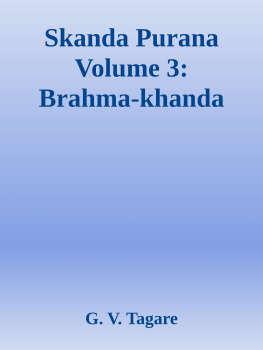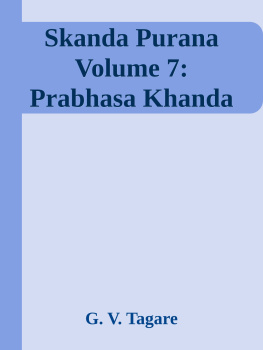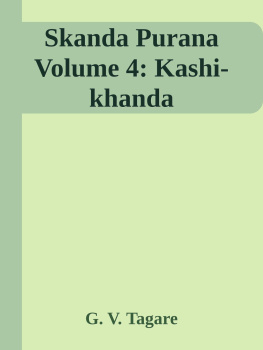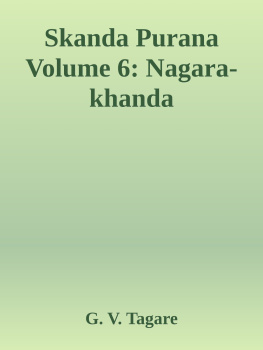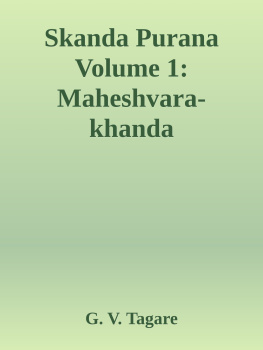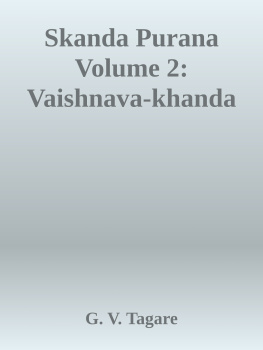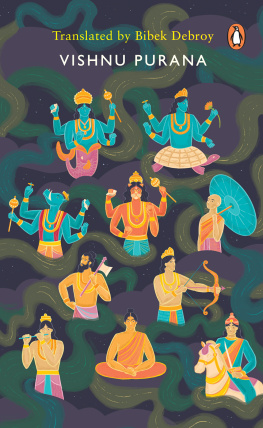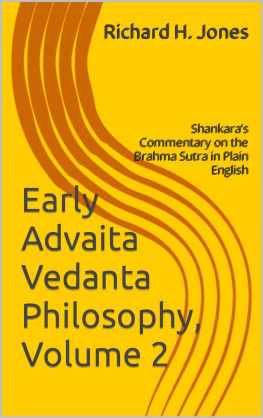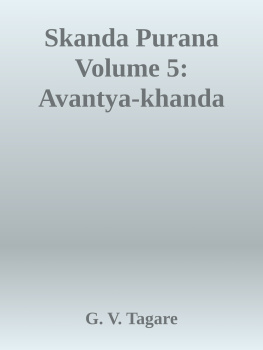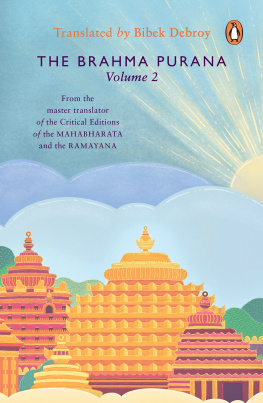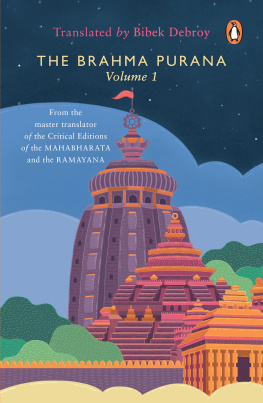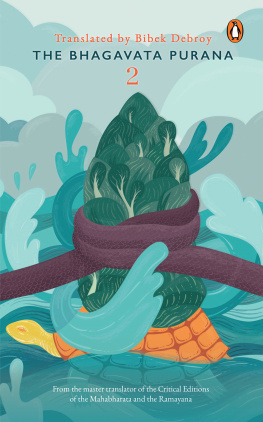G. V. Tagare - Skanda Purana Volume 3: Brahma-khanda
Here you can read online G. V. Tagare - Skanda Purana Volume 3: Brahma-khanda full text of the book (entire story) in english for free. Download pdf and epub, get meaning, cover and reviews about this ebook. genre: Religion. Description of the work, (preface) as well as reviews are available. Best literature library LitArk.com created for fans of good reading and offers a wide selection of genres:
Romance novel
Science fiction
Adventure
Detective
Science
History
Home and family
Prose
Art
Politics
Computer
Non-fiction
Religion
Business
Children
Humor
Choose a favorite category and find really read worthwhile books. Enjoy immersion in the world of imagination, feel the emotions of the characters or learn something new for yourself, make an fascinating discovery.
- Book:Skanda Purana Volume 3: Brahma-khanda
- Author:
- Genre:
- Rating:4 / 5
- Favourites:Add to favourites
- Your mark:
- 80
- 1
- 2
- 3
- 4
- 5
Skanda Purana Volume 3: Brahma-khanda: summary, description and annotation
We offer to read an annotation, description, summary or preface (depends on what the author of the book "Skanda Purana Volume 3: Brahma-khanda" wrote himself). If you haven't found the necessary information about the book — write in the comments, we will try to find it.
Skanda Purana Volume 3: Brahma-khanda — read online for free the complete book (whole text) full work
Below is the text of the book, divided by pages. System saving the place of the last page read, allows you to conveniently read the book "Skanda Purana Volume 3: Brahma-khanda" online for free, without having to search again every time where you left off. Put a bookmark, and you can go to the page where you finished reading at any time.
Font size:
Interval:
Bookmark:
This page describes Setu-mahatmya which is section 1 of the English translation of the Skanda Purana, the largest of the eighteen Mahapuranas, preserving the ancient Indian society and Hindu traditions in an encyclopedic format, detailling on topics such as dharma (virtous lifestyle), cosmogony (creation of the universe), mythology (itihasa), genealogy (vamsha) etc.
The Setumhtmya (.
Note: SETU: Adams Bridge between and completed it on the 13th day of the bright half of Paua. i.e. within four days.
In the Text Rmasetu signifies the region around Setu and is also called .
This page describes The Merit of Visiting Setu which is chapter 2 of the English translation of the Skanda Purana, the largest of the eighteen Mahapuranas, preserving the ancient Indian society and Hindu traditions in an encyclopedic format, detailling on topics such as dharma (virtous lifestyle), cosmogony (creation of the universe), mythology (itihasa), genealogy (vamsha) etc. This is the second chapter of the Setu-mahatmya of the Brahma-khanda of the Skanda Purana.
[]
Obeisance to r
Obeisance to
1a. For the prevention of all obstacles one should meditate upon the four-armed, moon-complexioned Lord , clad in white garments, whose kindly disposed countenance exudes pleasure (everywhere).
1b-6. In the highly meritorious forest of and free from jealousy. They were devoted to observance of the vow of truthfulness. They had conquered the sense-organs and anger. They were compassionate towards all living beings. They worshipped the eternal Lord Viu with great devotion.
Once, those noble-souled sages convened an excellent assembly.
They were engaged in telling highly meritorious stories destructive of sins. They were eager to know the means for the achievement of both worldly pleasures and salvation. They were discussing that matter mutually. There were twenty-six thousand sages of purified souls. It is impossible to mention the number of their disciples and disciples disciples.
7. In the meanwhile, , came to Naimia forest.
8. On seeing the sage coming, refulgent like a blazing fire, the sages, aunaka and others, honoured him with etc.
9. When Sta was comfortably seated on a splendid seat, the sages, with a desire to bless the world, asked him (questions about) highly esoteric matters.
10-15a. O Sta, O great sage conversant with the principles of Dharma, welcome unto you. You have heard the Puras from Vysa, the son of , be pleased to narrate this and everything else. Preceptors should disclose even secret doctrines to an affectionate disciple.
On being asked thus by the inhabitants of Naimia forest, Sta, at the outset, bowed down to Vysa, his preceptor, and began to recount:
15b-18a. Your questions are very well put, O , regarding what is conducive to the welfare of the universe. I shall speak out this secret to you. Listen respectfully, O great sages. This has never been disclosed to anyone before by me. Having controlled your minds, O eminent Brhmaas, listen with devotion.
There is a sacred spot named in Rmasetu. It is the most excellent one among holy places and Trthas.
18b-19. There is no doubt about it that the moment one sees Rmasetu, one gets liberation from the sea of worldly existence, that devotion either to Hari or Hara will be generated, that one will have abundance of merit and that the fruit of the three types of Karma will be achieved.
20. Listen, O great sages, I shall tell the merit of one who, in the course of his life, devoutly visits .
21. Along with two crores of generations of his maternal and paternal families, he will enjoy for a and thereafter will attain salvation.
22. The dust particles on the earth can be counted. The stars in the firmament can be enumerated. But the merit resulting from a visit to Setu cannot be estimated even by .
23. is glorified as the form of all the deities. Who is competent to reckon the merit of the man who has visited it?
24. By visiting Setu, O Brhmaas, a ) as one who has performed all sacrifices. He is on a par with one who has bathed in all the Trthas or with one who has performed all kinds of penances.
25. If anyone tells anyone else Go to Setu, he too attains that benefit, O Brhmaas. Of what avail is much talk?
26. A man who has taken his holy bath in Setu goes to the abode of Viu accompanied by seven crores of the members of his family and becomes liberated there itself.
27. It is true that a man who thinks about Setu, the mountain is absolved of all sins.
28. Accompanied by a hundred thousand crores of members of his paternal and maternal families, he goes to the abode of Viu
and becomes liberated there itself. He stays in the region of abhu for a period of three and becomes liberated there itself.
29. One who takes his holy bath in Setu, never sees the hells river.
30. One who performs ablutions in Setu never sees (the hells) Taptala, Taptail, Purahrada and oitakpa.
31-32. One who visits Setu does not fall into the hells lmalyrohaa, Raktabhojana, , vamsabhojana, Vahnijvlpraveana, ilvi, Vahnivi, Klastraka, Krodaka and Uatoya.
33-34a. A man who regulary bathes in Setu, O Brhmaas, may have committed five (great) sins. Yet, accompanied by a hundred crores of the members of his maternal and paternal families, he stays in the region of Viu for three Kalpas and becomes liberated there itself.
34b-36. A person who regularly bathes in Setu never sees the hells (where the joints are burned), Agraayybhramaa (where a sinner has to roll on a bed of fires) and Musalamardana (where a sinner is thrashed with threshing rods).
37-41. If anyone thinks like I will take my bath in Setu and takes a hundred paces (towards it), he shall, even if he has committed great sins, become free of sins. He will not fall into any of the following hells: where a sinner is pulled and stretched between many wooden machines, where a sinner is pierced with weapons, where he is thrown up and made to fall, where he has to be crushed with iron clubs and staffs, where he is hit with the tusks of elephants, where he is bitten by different kinds of serpents, where he has to inhale smoke, where he is bound with nooses, where he is pierced with spears and lances of various kinds, where acrid and corroding liquids are poured into the mouth or nostrils, where saltish water is drunk and where heated iron needles are thrust into the mouth.
42-47. One who bathes in Setu does not see the following dreaded hells: where a sinner has to enter holes and pits filled with alkaline fluids, where a sinner is compelled to eat faeces, where sinners are cut, where sinners are burned, where bones are crushed, where phlegm is eaten, where is drunk, where extremely bitter liquids are administered, where a sinner is forced to drink very hot (boiling) oil, or to drink corrosive alkaline liquids, where a sinner has to drink astringent water, where he has to eat heated pebbles, where a sinner is showered (bathed) with extremely hot sand particles, where the teeth of a sinner are shattered, where a sinner has to lie on red hot iron, where a sinners eyes, mouth and joints are pricked with needles, where weighty iron pieces are tied to the penis and the testicles, where a sinner is compelled to fall down from the top of a tree into a pit filled with foul-smelling (rubbish), where a sinner has to lie down on a bed of sharp-edged weapons and where a sinner has to imbibe semen virile.
48-51. If a person lies on the sand of Setu and the particles of sand stick to his body, O excellent Brhmaas, as many sins of killing Brhmaas as there are sand particles sticking to his body are destroyed. There is no doubt about it.
Font size:
Interval:
Bookmark:
Similar books «Skanda Purana Volume 3: Brahma-khanda»
Look at similar books to Skanda Purana Volume 3: Brahma-khanda. We have selected literature similar in name and meaning in the hope of providing readers with more options to find new, interesting, not yet read works.
Discussion, reviews of the book Skanda Purana Volume 3: Brahma-khanda and just readers' own opinions. Leave your comments, write what you think about the work, its meaning or the main characters. Specify what exactly you liked and what you didn't like, and why you think so.

